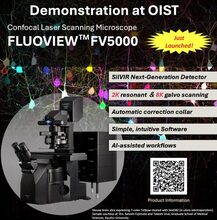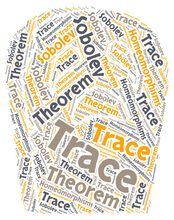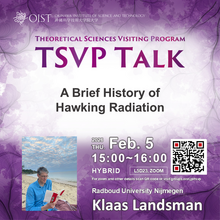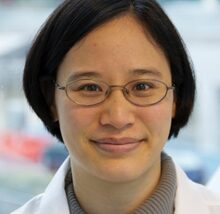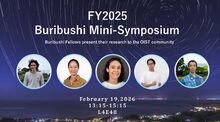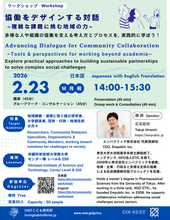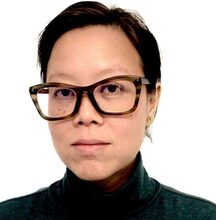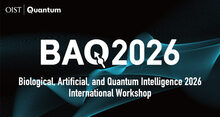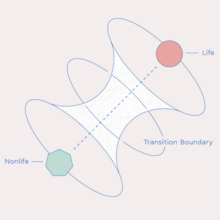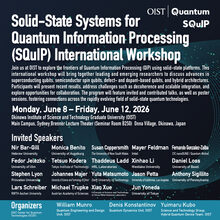Upcoming Events
[Seminar] "Looking at neurodevelopmental disorders through the lens of evolution: a role for the autolysosomal pathway" by Prof. Nael Nadif Kasri, Radboud University
Date: Monday, February 2, 2026 - 11:00 to 12:00 @L5D23, Lab5
Title: "Looking at neurodevelopmental disorders through the lens of evolution: a role for the autolysosomal pathway"
Speaker: Prof. Nael Nadif Kasri, Radboud University
Evident FLUOVIEW FV5000 Seminar and demonstration
Evident FV5000 seminar and demonstration
[Seminar] Dr. Giovanni Consoli, Imperial College London
Dr. Giovanni Consoli, Postdoctoral Fellow from Imperial College London
2026 Analysis on Metric Space Seminar: "The Trace Theorem for Sobolev Homeomorphisms" by Dr.Aleksis Koski, Aalto University
Title:The Trace Theorem for Sobolev Homeomorphisms
Abstract: Classical Sobolev trace theory tells us when a boundary map can be extended as a Sobolev function inside a given domain in R^n. For the purposes of minimization problems in Nonlinear Elasticity, it is natural to rephrase this question in the context of extending a given embedding of the boundary as a homeomorphic Sobolev map. In this talk, I will explain what is known about this problem, ending with a full trace theory for Sobolev homeomorphisms in 2D.
2026 Analysis on Metric Space Seminar: "P-Dirichlet spaces and the resolution of the resistance and energy image density conjectures" by Prof.Sylvester Eriksson-Bique, University of Jyv¨askyl¨a
Title: P-Dirichlet spaces and the resolution of the resistance and energy image density conjectures
Abstract: I will describe the resolution of two conjectures related to Dirichlet forms. In both cases a conceptually simple solution arises by stepping away from the p=2 regime. This leads to a new definition of a p-Dirichlet space, which unifies three quite different areas: Dirichlet form theory, Analysis on fractals and Analysis on metric spaces. The talk includes joint work with Mathav Murugan
TSVP Talk: "A Brief History of Hawking Radiation" by Klaas Landsman
TSVP Talk Language: English (no interpretation). Target audience: General audience / everyone at OIST and beyond. Freely accessible to all OIST members and guests without registration (also via Zoom).
School: Introduction to Isogeny-based Cryptography (TSVP-TP25IC)
Title : "Introduction to Isogeny-based Cryptography"
Abstract : Isogeny-based cryptography is a fast-moving field, and recent developments have introduced several new techniques, making the barrier of entry particularly high for young researchers wishing to work in the field. To aid new researchers in the field is the aim of this "summer" school, which introduces all of the many essential tools that are used today. Among the topics to be covered are the correspondences between ideals and isogenies that give rise to both the Deuring correspondence, which is an essential part of protocols such as SQIsign, and the class group action on CM curves and oriented supersingular curves, which gives other cryptographic primitives such as CSIDH and SCALLOP. Further, higher dimensional abelian varieties and isogenies between these have recently become an integral part of isogeny-based cryptography, providing huge improvements to many existing protocols, as well as creating new protocols.
QG Seminar (Zoom): Non-supersymmetric strings on AdS3, Hassaan Saleem, (SUNY Albany)
QG Seminar (Zoom) Speaker: Hassaan Saleem, (SUNY Albany) Title: Non-supersymmetric strings on AdS3
2026 IUPAC Global Women's Breakfast at OIST
Early life sleep shapes brain development and social behavior in the socially monogamous prairie vole
Lecture title: Early life sleep shapes brain development and social behavior in the socially monogamous prairie vole
Speaker: Miranda M. Lim, MD, PhD, Professor in the Department of Neurology at Oregon Health & Science University.
[Seminar] "Molecular functions of the nuclear lamina in cell aging & senescence" by Dr. Oliver Dreesen
Speaker: Dr. Oliver Dreesen, Senior Principal Investigator, Cell Aging Laboratory, A*STAR Skin Research Laboratories (A*SRL)
Talk Title: Molecular functions of the nuclear lamina in cell aging & senescence
Lecture: "A Survey on Supersingular Abelian Varieties" by Tomoyoshi Ibukiyama
FY25 Buribushi Mini-Symposium
Faculty Affairs Office (FAO) is pleased to announce the first Buribushi Mini-Symposium , to be held on Thursday, February 19, 2026 . All OIST faculty, researchers, students, and staff are warmly invited to attend. Come and join us for a fun research talk !
Advancing Dialogue for Community Collaboration: Tools & perspectives for working beyond academia
A workshop on developing collaboration across sectors to work effectively with community to advance research and activities addressing social challenges.
Speaker: Takuji Hiroishi, CEO, Empublic Inc. , Japanese with English translation
[Seminar] "From electrically conductive MOFs to sustainable batteries" by Prof. Mircea Dincă (Princeton University)
Prof. Mircea Dincă , Department of Chemistry, Princeton University
【Seminar】"An odor patch foraging task to study learning and decision making" by Dr. Cindy Poo, the Allen Institute
Speaker: Cindy Poo, a senior scientist with the Allen Institute for Neural Dynamics and an Affiliate Assistant Professor in the Department of Physiology and Biophysics at the University of Washington
Presidential Lecture Q and A by Kris Gopalakrishnan
TBD
Emerging Concepts in Cell Division Cycles: From Early Development to Cancer and Aging
OIST Workshop | Website | Main organizer: Tomomi Kiyomitsu (Cell Division Dynamics Unit) | OIST members are welcome to attend all scientific sessions. Meals are closed sessions for registered participants only.
【Workshop】Biological, Artificial, and Quantum Intelligence 2026 International Workshop (BAQ2026)
The Biological, Artificial, and Quantum Intelligence 2026 International Workshop (BAQ2026) will bring together world-leading experts in neural networks, neuroscience, quantum machine learning, and related areas of intelligence and complexity. It aims to provide a platform for discussions on recent developments and future perspectives in these fields. Open to OIST Community!
[Seminar] In-plane oscillations of a slack catenary using assumed modes by Prof.Anindya Chatterjee
Title: In-plane oscillations of a slack catenary using assumed modes.
Speaker: Dr. Anindya Chatterjee, Professor, Mechanical Engineering, IIT Kanpur
(collaborators: Bidhayak Goswami and Indrasis Chakraborty)
Workshop on Cognitive Neurorobotics
Workshop on Cognitive Neurorobotics
Organized by Jun Tani, Tani Unit, OIST
March 5, 13:30—18:00, Seminar room L5D23, Lab 5
Tentative program
13:30-13:40: Introduction, Jun Tani, OIST
13:40-14:40: Collective Intelligence in LLM agents, Takashi Ikegami, Univ. of Tokyo
14:40-15:40: Deep Active Inference for Real-World Robotic Systems, Shingo Murata, Keio Univ.
15:40-16:00: Coffee break
16:00-17:00: A Consideration of Robot Foundation Models as Embodied Intelligence, Tetsuya Ogata, Waseda Univ.
17:00-18:00: Propagation of Mind Through the Mechanism of Superposition, Hiro Iizuka, Hokkaido Univ.
Building a Sustainable and Resilient Future: Addressing Demographic Challenges, Health and Gender Disparities, and Economic Inequality
OIST Workshop | Website | Main organizer: Yuliya Kulikova (Science and Technology Group)| OIST members are welcome to attend all scientific sessions. Meals are closed sessions for registered participants only.
International Symposium of Life-Nonlife Transition: Boundaries Between Life and Nonlife
International Symposium of Life-Nonlife Transition: Boundaries Between Life and Nonlife, March 18-19, at Institute of Industrial Science, The University of Tokyo, Language: English, Registration needed.
Ocean Dynamics and Turbulence
OIST Workshop | Website | Main organizer: Amin Chabchoub (Marine Physics and Engineering Unit) |OIST members are welcome to attend all scientific sessions. Meals are closed sessions for registered participants only.
Advances in Photoemission Techniques: Probing Space, Energy, Momentum, and Time
OIST Workshop | Website | Main organizer: Keshav Dani (Femtosecond Spectroscopy Unit) |OIST members are welcome to attend all scientific sessions. Meals are closed sessions for registered participants only.
Solid State Systems for Quantum Information Processing
OIST Workshop | Website | Main organizer: William Munro (Quantum Engineering and Design Unit) |OIST members are welcome to attend all scientific sessions. Meals are closed sessions for registered participants only.
2nd OIST-Oxford-SLMath Summer Graduate School on Analysis and Partial Differential Equations
OIST Workshop | Website | Main organizer: Ugur Abdulla (Analysis and Partial Differential Equations Unit) |OIST members are welcome to attend all scientific sessions. Meals are closed sessions for registered participants only.
Information Theory in Modern Science
OIST Workshop | Website | Main organizer: Amedeo Roberto Esposito (Information Theory, Probability, and Statistics Unit) |OIST members are welcome to attend all scientific sessions. Meals are closed sessions for registered participants only.
International Conference on Embodied Cognitive Science (ECogS 2026)
OIST Workshop | Website | Main organizer: Tom Froese (Embodied Cognitive Science Unit) | OIST members are welcome to attend all scientific sessions (registration required).
Machine Learning Summer School 2027
OIST Workshop | Website | Main organizer: Makoto Yamada (Machine Learning and Data Science Unit) |OIST members are welcome to attend all scientific sessions. Meals are closed sessions for registered participants only.





